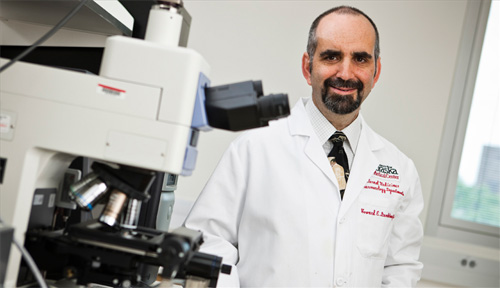The following awards were received by College of Medicine faculty during the month of October. These 23 new awards represent more than $10.3 million in new funding to UNMC.
Howard Gendelman, M.D., pharmacology & experimental neuroscience, has received a National Institutes of Health R01 award for $3.1 million from the National Institute on Aging. An extension of Dr. Gendelman’s program grant, “ Neural Immunity in HIV Dementia,” this shared investigator award builds on prior successes in developing long-acting nanoformulated antiretroviral therapies (nanoART) to improve drug delivery and therapeutic outcomes for aged virus-infected people.
Paras Mishra, Ph.D., cellular & integrative physiology, has received a National Institutes of Health R01 award for $1.9 million from the National Heart, Lung, and Blood Institute. Dr. Mishra will examine the role of tiny regulatory molecules, MicroRNAs (miRNAs), in cardiac dysfunction in diabetes. Dr. Mishra hypothesizes that oxidative stress may influence these miRNAs and that targeting these regulatory molecules may lead to a treatment for diabetic cardiomyopathy.
Cyrus DeSouza, M.D., internal medicine – diabetes, endocrinology, metabolism, is the UNMC lead for a National Institutes of Health multi-center clinical trial. The goal of this $1.7 million National Institute of Diabetes and Digestive and Kidney Disease study is to determine if vitamin D supplementation works to delay the onset of type 2 diabetes in people at risk for the disease and to gain a better understanding of how vitamin D affects glucose (sugar) metabolism. This nationwide study assembles a team of highly qualified investigators with complementary expertise and experience in conducting nutrition-based multicenter trials, Dr. DeSouza will oversee the sole Nebraska site.
Carol Casey, Ph.D., internal medicine – gastroenterology, has received a National Institutes of Health R21 award for $380,000 from the National Institutes on Alcohol Abuse and Alcoholism. Dr. Casey will examine how alcohol exposure can lead to altered processing and the breakdown of a glycoprotein, CEA, secreted by tumor cells, which when elevated has been linked to a potential for colon cancer cells to form liver metastases.
Quan Dong Nguyen, M.D., ophthalmology and visual sciences, has received three Juvenile Diabetes Research Foundation International awards, totaling more than $1.1 million. Dr. Nguyen will serve as both the Reading Center and Coordinating Center for the iDEAL study, which aims to address the leading cause of blindness, diabetic macular edema, in people with type 1 and type 2 diabetes. Dr. Nguyen also will head a Phase II interventional clinical trial to assess the safety and effectiveness of an antibody-based therapeutic agent in the treatment of diabetic macular edema either alone or in combination with ranibizumab or laser photocoagulation through the iDEAL study.
Dr. Nguyen is also the UNMC lead on an industry-sponsored Phase II clinical trial which will explore the safety and effectiveness of a potent immunosuppressant drug in the treatment of uveitis.
Four National Strategic Research Institute (NSRI) awards were received in October. They were:
Ben Boedeker, M.D., anesthesiology, has received two NSRI awards representing more than $470,000 in new funding. The projects – “Expansion of a Multi-Disciplinary, Joint-Service Advanced Telemedicine Service for Military Medical Care in Deployed Regions” and “Creation of a Pilot Tele-Preoperative Medicine Clinic at Landstuhl Regional Medical Center” – both extend Dr. Boedeker’s work in remote medical assistance and emergency interventions.
Tony Sambol, pathology and microbiology, has received a NSRI award for $230,000 for his project titled “Biosurveillance Baseline Assessment Support.” The project furthers his research in the early diagnosis of emerging diseases.
Marilynn Larson, Ph.D., pathology and microbiology, has received a NSRI award for $140,000 for her project titled “Francisella tularensis Differentiation Assays.” Dr. Larson’s project furthers her research in the characterization of zoonotic diseases.
